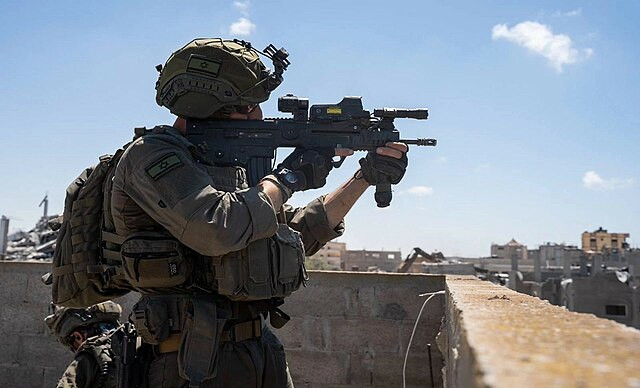Israel's military confirmed the death of Mohammed Deif, the leader of Hamas' military wing, in a statement released Thursday. Deif, a key figure behind Hamas' October 7 attack on southern Israel, was killed during an Israeli airstrike in Khan Younis, Gaza, on July 13. This announcement marks the third high-profile figure linked to Hamas or Iran killed by Israel in recent weeks.
Deif's death was confirmed by an "intelligence assessment" following the airstrike, which also resulted in the deaths of several other militants. "Other terrorists were eliminated" alongside Deif, the statement noted. Israeli Defense Minister Yoav Gallant hailed the operation as a "significant milestone" in dismantling Hamas' military and governing capabilities in Gaza.
Hamas has yet to comment on the announcement. The news of Deif's death comes amid escalating tensions, following the recent assassination of Hamas' political chief, Ismail Haniyeh, in Iran. The attack on Haniyeh, who was killed shortly after attending an inauguration ceremony for Iranian President Masoud Pezeshkian, has sent shockwaves across the Middle East.
Iran's Supreme Leader Ayatollah Ali Khamenei, who presided over Haniyeh's funeral in Tehran, vowed severe punishment in response to the killing. "The fact that he was assassinated as a guest of Iran makes this extremely humiliating for Iran," said Andreas Krieg, a military analyst and senior lecturer at King's College London.
Israel and Iran have long been adversaries, with tensions simmering since the 1979 Islamic Revolution in Iran. Israel views Iran as an existential threat due to its support of militant groups like Hezbollah in Lebanon and the Houthis in Yemen. Tehran, in turn, sees Israel as a key antagonist in the region.
The killing of Deif, who had been a central figure in Hamas' military operations for over two decades, represents a significant blow to the organization. Deif, 58, commanded the al-Qassam Brigades and was instrumental in developing Hamas' network of tunnels and bomb-making expertise. His deputy, Marwan Issa, was killed in a March airstrike.
The Israeli military also highlighted Deif's role in planning the October 7 attack, which resulted in the deaths of nearly 1,200 Israelis and the capture of over 200 hostages. The subsequent Israeli military response has led to the deaths of almost 40,000 Palestinians and left Gaza in ruins.
Despite these significant losses for Hamas, military analyst Andreas Krieg noted that "neither Israel nor Iran has any interest in all out escalation." He suggested that both Deif and Haniyeh's assassinations occurred within the confines of the ongoing sub-threshold war between Israel and its adversaries.
Secretary of State Antony Blinken called for restraint, urging all parties in the Middle East to avoid actions that could further escalate the conflict. Blinken emphasized that a cease-fire between Israel and Hamas is crucial to breaking the cycle of violence and suffering.
Qatari Prime Minister Sheikh Mohammed bin Abdulrahman Al Thani expressed concern that Haniyeh's death could hinder efforts to negotiate a cease-fire and secure the release of hostages. "How can mediation succeed when one party assassinates the negotiator on the other side?" he asked.




